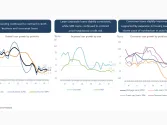
Australia healthcare spending signals future growth
High demand is forecasted in the pharmaceuticals industry.
Healthcare spending in Australia is seeing a rise due to its growing pensionable population, a Fitch Solutions report reflected. Changing lifestyles and the pandemic has added to the growth.
The report noted that as incidence of chronic conditions are rising amongst the population with strong bias towards branded drugs, Australian patients will require costly prescriptions and long-term treatment. Similarly, higher healthcare spending will be needed for a range of diagnostic tests, rehabilitation and similar facilities and treatments.
The report also predicts Australia to remain one of the most attractive markets globally for innovative drugmakers due to the strength of its regulatory environment and positive demographic trends.
In addition, Australia's Department of Health has outlined its focus on streamlining the drug approval processes undertaken by the Therapeutic Goods Administration which will be highly beneficial for multinational drugmakers.
High-value medicines such as Verzenios (abemaciclib), used for treating advanced or metastatic breast cancers in adult non-premenopausal patients, gained Pharmaceutical Benefits Scheme (PBS) listing at the start of this year. It is estimated that more than 19,000 women and 160 men will be diagnosed with breast cancer in Australia this year. Approximately 3,000 patients with breast cancer will be treatable with abemaciclib. Patients accessing the drug via the PBS will pay $28.1 a script, or $4.5 for concessional patients. Without the subsidy, the drug would cost up to $37,817 a year.
The government also continues to subsidise the cost of medicines for every medicine approved by the Pharmaceutical Benefits Advisory Committee to ensure that new, essential medicines are affordable for all Australians.
Whilst the country's high burden of non-communicable disease will continue to stimulate interest amongst drugmakers, the arrival of high-value pharmaceuticals to the treatment landscape will further incentivise the government to increase its cost-containment measures and encourage the switch to generic medicines where possible.
Australia's rising chronic disease burden, increasing health costs and limited public financing options will also pose significant challenges to the healthcare sector over the coming years, thereby pushing the government to call on private investors to provide better facilities and access to more specialised care.
In the long term, this will shape commercial opportunities for private healthcare providers and foreign drugmakers. Given the government's view that strong private sector involvement in health services provision and financing is essential to the viability of the Australian health system, it provides a 30% subsidy to individuals who acquire private health insurance and has introduced additional arrangements to foster life-long participation in private health insurance.



















 Advertise
Advertise





